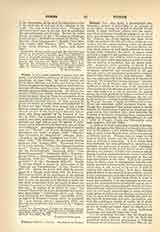

Ficker, JULIUS (more correctly CASPAR) VON, historian, b. at Paderborn, Germany, April 30, 1826; d. at Innsbruck, June 10, 1902. He studied history and law at Bonn, Munster, and Berlin, and during 1848-49 lived in Frankfort-on-the-Main, where he was closely associated with the noted historian, Bohmer, who proved himself a generous friend and patron. In 1852 he proceeded to Bonn, but shortly afterwards accepted an invitation from Count Leo Thun, the reorganizer of the Austrian system of education, to settle at Innsbruck as professor of general history. In 1863, however, he joined the faculty of jurisprudence, and his lectures on political and legal history drew around him a large circle of devoted and admiring pupils. In 1866 he was elected member of the Academy of Sciences, but retired, after being ennobled by the Emperor of Austria, in 1879. His numerous and important works extend over three branches of scientific history (i.e. political and legal history and the science of diplomacy), and in each division he discovered new methods of investigation. Among his writings those of especial note are: “Rainald von Dassel, Reichskanzler and Erzbischof von Koln” (Cologne, 1850); “Miinsterische Chroniken des Mittelalters” (Munster, 1851); “Engelbert der Heilige, Erzbischof von Koln” (Cologne, 1853); “Die Ueberreste des deutschen Reichsarchivs in Pisa” (Vienna, 1855). The second division of his works includes “Ueber einen Spiegel deutscher Leute” (Vienna, 1857); “Ueber die Entstehungszeit des Sachsenspiegels” (Innsbruck 1859); “Vom Reichsfürstenstande” (Innsbruck, 1861); “Forschungen zur Reichs-u. Rechtsgeschichte Italiens” (4 vols., Innsbruck, 1868-74); “Untersuchungen zur Rechtsgeschichte” (3 vols., Innsbruck, 1891-97). Finally he proved himself a master in diplomatics in his “Beitrage zur Urkundenlehre” (2 vols., Innsbruck, 1877-78). During the period 1859-1866, he was engaged in a literary controversy with the historian, Heinrich von Sybel, on the significance of the German Empire. Ficker advocated and defended the theory that Austria, on account of its blending of races, was best fitted as successor of the old empire to secure the political advancement both of Central Europe and of Germany. In support of his theory, he wrote “Das deutsche Kaiserreich in seinen universalen and nationalen Beziehungen” (Innsbruck, 1871), and “Deutsches Konigtum and Kaisertum” (Innsbruck, 1872). As legatee of Bohmer’s literary estate, he published the “Acta Imperii selecta” (Innsbruck, 1870) and directed the completion and revision of the “Regesta Imperii”.
PATRICIUS SCHLAGER

